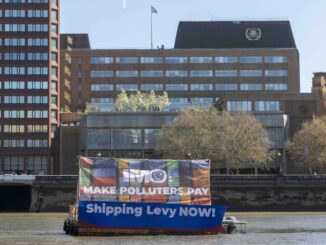
Rob Mortimer, managing director of fuel specialist Fuelre4m, takes a challenging look at the outcomes from last week’s IMO Intersessional Working Group on the Reduction of GHG Emissions from Ships
My biggest takeaways from the recent convening of 107 parties, representing 97% of the world’s shipping tonnage are:
- We’re committed to cutting pollution, if we don’t have to count the bits we don’t want to admit to.
- Creating more pollution, and more damaging pollution, from burning something different is OK if it helps drive business through new engine sales, new ‘clean fuel’ manufacturing, storage and distribution facilities, and if we completely cancel out the increased pollution generated.
- Net-Zero by 2050 means the air is open as the new real estate for business, governments and the stock markets.
- Putting a value on carbon and GHG trading is fuelling a rise in polluters to fuel pollution capture and trading because you can’t count what you haven’t produced and captured.
- The ‘future fuels’ vs ‘traditional fuels’ playing field is being perfectly skewed by the ‘Green Energy’ proponents, with massive influence over the IMO as to what to count and what to ignore when it comes to ‘well to wake’ comparisons.
- Those with the most influence over policy were not those looking to cut pollution. Let’s have transparency on agendas.
Let’s set the bar a little higher. Let’s talk about using technology that is available today to measure the Total Pollution Receipt (TPS) of a fuel, including blockchain ‘chain of custody’ from ingredients, through production and distribution, all the way to what we at Fuelre4m like to call PPP – Piston Pushing Power. And let’s consider the Fuel’s Energy Conversion Rate (FCR). How much of the megajoules of energy is converting to pushing power.
The shipping industry needs to stop burying its head in the sand and gets to grip with the efficiencies of fuel, not just focusing on the mantra that fossil fuels are bad, especially when they don’t know how much of the fuel is converting to thrust, and then repeating the same mistakes by not knowing the energy conversion or the supply chain pollution of other fuels either.
To me, cutting GHG and fossil fuel emissions isn’t a game of strategy, manipulating numbers to support the fuel technology of 2050 while ignoring the extra pollution created on the long and dirty journey to get there. It’s about genuinely optimising the combustion and consumption of every fuel now.
This IMO session has seen those with business interests in biofuels seeking to cover up the facts that, although CO2 production is ‘lower’ in biofuel blends, the energy density is also lower and, due to a poor combustion rate, a measure of FCR has shown that, as well as introducing fuel stability issues, a B20 blend requires 7%-8% more of the B20 fuel to produce the same PPP as LSFO. So the 84% credit on the B20 is cancelled by the 6-7% increase in LSFO consumption AND due to the higher temperature needed for primary combustion of biofuels, NOx goes mad. But nobody is measuring – yet. Wait until the biofuel suppliers have built the distribution and supply market. Then, once everyone is onboard, let’s tax the NOx that nobody told you about. Even better, let’s catch it and trade it!
Being pragmatic, I applaud that the IMO is driving forward, negotiating with all parties to try to find clear seas to drive towards the goal. Let’s not lose sight of the reality, though – fossil fuel consumption in the shipping industry increased last year. It will rise again for the next 25 years, with the mix of fuels changing but the pollution increasing, and in 2050 we’re going to look back and realise that the Net-Zero Framework became a game of ‘where to hide the skeletons’.
Cutting consumption and optimising the combustion of all fuels, old or new, is the only way to cut pollution. Burning something else at a different point in the fuel’s lifecycle, or at a less efficient FCR, is just whitewashing the greenwashing. Let’s not catch and trade pollution. Let’s cut the production of emissions at source, and reward that.
We give you energy news and help invest in energy projects too, click here to learn more





